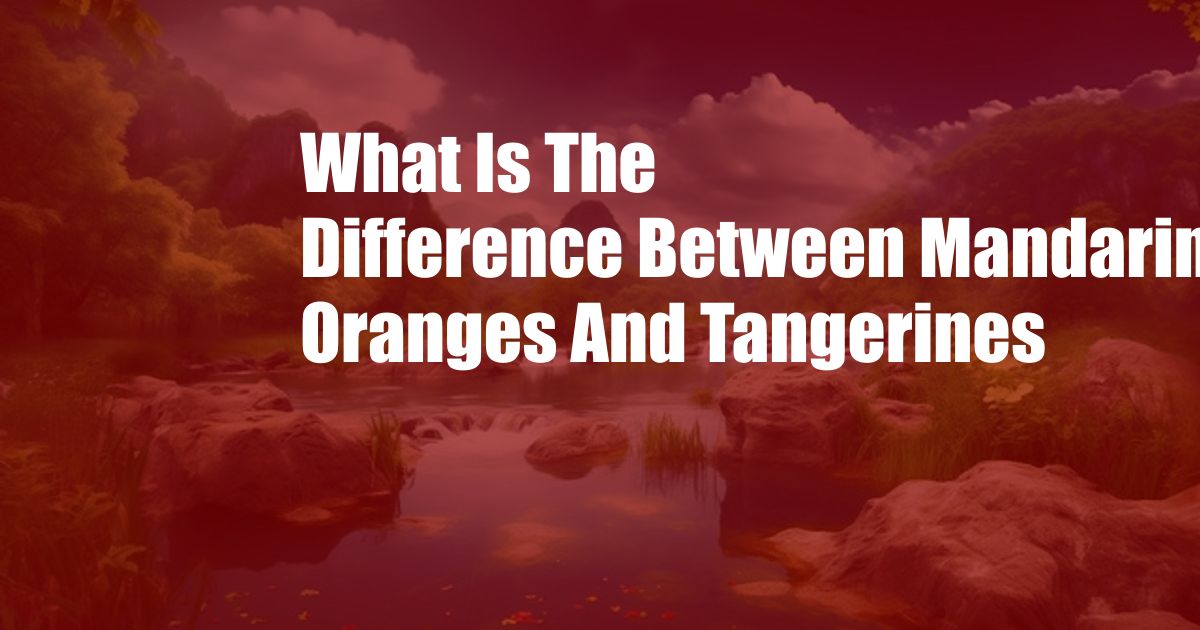
Mandarin Oranges vs. Tangerines: Unraveling the Tangy Citrus Duo
As a child, I was fascinated by the vibrant citrus fruits that adorned my grandmother’s breakfast table. Among them were two strikingly similar yet subtly distinct varieties: mandarin oranges and tangerines. Their sweet-tart flavor profiles and juicy segments enticed me to delve deeper into their unique characteristics.
Now, as a seasoned food blogger, I am eager to share my knowledge of these delectable fruits with you. Join me on this culinary adventure as we explore the intricacies that set mandarin oranges apart from tangerines.
Taxonomy and Origin: A Tangy Tale
Mandarin oranges and tangerines, both belonging to the genus Citrus, are closely related species within the Rutaceae family. The mandarin orange, scientifically known as Citrus reticulata, has its origins in Southeast Asia, while the tangerine, Citrus tangerina, hails from Morocco. Both fruits have long been prized for their sweet and juicy qualities, making them beloved by citrus enthusiasts worldwide.
Physical Attributes: A Visual Distinction
At first glance, mandarin oranges and tangerines may seem like identical twins. However, upon closer inspection, several key distinctions emerge:
- Size and Shape: Mandarin oranges are typically larger than tangerines, with a diameter ranging from 6 to 8 centimeters (2.4 to 3.1 inches). They exhibit a more spherical or slightly oblate shape, while tangerines tend to be slightly smaller and oval-shaped.
- Skin Texture: The skin of mandarin oranges is relatively thin and smooth, with a deep orange or red-orange hue. Tangerines, on the other hand, have a thicker, looser skin that is dotted with small oil glands. They come in various shades of orange and are often marked with greenish-yellow patches.
- Flesh: Mandarin oranges possess a juicy, tender flesh that is easy to separate into segments. The flesh is usually seedless or contains only a few small seeds. Tangerines have a similar juicy and flavorful flesh, although they may contain more seeds.
Flavor Profile: A Burst of Citrusy Goodness
Both mandarin oranges and tangerines are renowned for their sweet-tart flavor profile, although they exhibit subtle differences:
- Mandarin Oranges: Mandarin oranges are often described as having a sweeter and more aromatic flavor than tangerines. They offer a harmonious balance of sweetness and acidity, with a slightly floral or honeyed note.
- Tangerines: Tangerines are typically slightly tarter than mandarin oranges, with a more pronounced tangy zest. Their flavor is often sharp and refreshing, with a lingering hint of bitterness.
Nutritional Profile: A Citrusy Powerhouse
Mandarin oranges and tangerines are packed with essential vitamins, minerals, and antioxidants that contribute to our well-being:
- Vitamin C: Both fruits are excellent sources of vitamin C, a vital nutrient for immune function and antioxidant defense.
- Potassium: Mandarin oranges and tangerines are rich in potassium, which aids in maintaining healthy blood pressure and heart function.
- Fiber: The soluble fiber present in these fruits promotes digestive health and satiety.
- Antioxidants: They contain various antioxidants, including beta-carotene, flavonoids, and hesperidin, which protect cells from damage caused by free radicals.
Culinary Delights: A Tangy Treat
Mandarin oranges and tangerines are highly versatile fruits that add a vibrant burst of flavor to various culinary creations:
- Fresh Fruit: Enjoy these fruits as a healthy and refreshing snack or add them to fruit salads for a tangy twist.
- Salads: Mandarin orange or tangerine segments add a sweet and juicy touch to savory salads, such as green salads or Asian-inspired salads.
- Desserts: The sweet-tart flavor of these fruits complements desserts wonderfully, whether it’s citrus tarts, cakes, or cheesecakes.
- Drinks: Freshly squeezed mandarin orange or tangerine juice is a refreshing and thirst-quenching beverage. It can also be mixed with other fruit juices for a zesty blend.
Expert Tips for Choosing and Enjoying Mandarin Oranges and Tangerines
To get the most out of your mandarin orange or tangerine experience, follow these expert tips:
- Choose ripe fruits: Look for fruits with a vibrant color and a slightly soft feel to the touch. Avoid fruits that are excessively hard or have bruises or soft spots.
- Store properly: Store mandarin oranges and tangerines in a cool, dry place for up to a week. For longer storage, keep them in the refrigerator for up to 3 weeks.
- Peel with ease: Mandarin oranges and tangerines are generally easy to peel. Use a sharp knife to score the skin around the circumference of the fruit and gently pull it apart.
By following these simple tips, you can enjoy the full flavor and nutritional benefits of these delectable citrus fruits.
Frequently Asked Questions About Mandarin Oranges and Tangerines
Q: Are mandarin oranges and tangerines the same fruit?
A: Mandarin oranges and tangerines are closely related species but have distinct genetic and physical characteristics.
Q: Which fruit is sweeter, mandarin oranges or tangerines?
A: Mandarin oranges are typically sweeter than tangerines, with a milder and more aromatic flavor.
Q: How can I tell if a mandarin orange or tangerine is ripe?
A: Look for fruits with a vibrant color and a slightly soft feel to the touch. Avoid fruits that are excessively hard or have bruises or soft spots.
Q: Can I freeze mandarin oranges or tangerines?
A: Yes, you can freeze them for up to 6 months. Peel the fruits and place them in an airtight container before freezing.
Conclusion
Mandarin oranges and tangerines, while similar in appearance, offer unique variations in their flavor, appearance, and nutritional content. Whether you prefer the sweeter notes of mandarin oranges or the slightly tarter zest of tangerines, both fruits offer a vibrant and healthy addition to any diet. Embrace their culinary versatility and savor the juicy and tangy goodness they bring.
Share with us your thoughts on this citrusy exploration. Are you a fan of the sweet mandarin orange or the tangy tangerine? Let us know in the comments below!